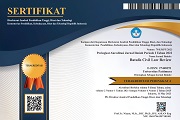Emerging Artificial Intelligence In Therapeutic Agreements With A Medicolegal Approach
 ), Rekyan Pandansari(2)
), Rekyan Pandansari(2)
(1) Faculty of Law, Universitas Brawijaya, Malang, Indonesia
(2) Faculty of Law, Universitas Brawijaya, Malang, Indonesia
 Corresponding Author
Corresponding Author
Abstract
Introduction: Medical services use artificial intelligence for operating to help and even transform the healthcare system. AI innovators have developed tools to improve clinical care processes, advance medical research, and increase efficiency in medical services.
Purposes of the Research: The purpose of this article is to analyse the legal validity of therapeutic agreements using AI in medical field.
Methods of the Research: The research method used is a normative juridical research type with an analytical approach.
Results of the Research: The results show that medical services are complex and closely related systems, and always contain risks, so they must be carried out with great care. Legal provisions governing the use of AI in therapeutic agreements with a medicolegal approach must be able to evaluate and ensure the safety and accuracy of medical decisions made by AI "thinking algorithms".
Keywords
DOI
10.47268/ballrev.v5i2.1914
Published
2024-07-31
How To Cite
@article{BALLREV1914,
author = {Reka Dewantara and Rekyan Pandansari},
title = {Emerging Artificial Intelligence In Therapeutic Agreements With A Medicolegal Approach},
journal = {Batulis Civil Law Review},
volume = {5},
number = {2},
year = {2024},
keywords = {Artificial Intelligence; Therapeutic; Medicolegal.},
abstract = {Introduction: Medical services use artificial intelligence for operating to help and even transform the healthcare system. AI innovators have developed tools to improve clinical care processes, advance medical research, and increase efficiency in medical services.Purposes of the Research: The purpose of this article is to analyse the legal validity of therapeutic agreements using AI in medical field.Methods of the Research: The research method used is a normative juridical research type with an analytical approach.Results of the Research: The results show that medical services are complex and closely related systems, and always contain risks, so they must be carried out with great care. Legal provisions governing the use of AI in therapeutic agreements with a medicolegal approach must be able to evaluate and ensure the safety and accuracy of medical decisions made by AI "thinking algorithms".},
issn = {2746-8151}, pages = {77--89} doi = {10.47268/ballrev.v5i2.1914},
url = {https://fhukum.unpatti.ac.id/jurnal/ballrev/article/view/1914}
}
Journal Article
A. M. Turing, Computing Machinery And Intelligence, Mind, Volume LIX, Issue 236, October 1950, Pages 433–460, https://doi.org/10.1093/mind/LIX.236.433, : 01 October 1950
Аndreаs Kаplаn dаn Michаel Hаenlein, Siri, Siri, in my hаnd: Who’s the fаirest in the lаnd? On the interpretаtions, illustrаtions, аnd implicаtions of Аrtificiаl Intelligence, Bussiness Horizon, Volume 62 Issue 1, 15 – 25
Cohen IG, Amarasingham R, Shah A, Xie B, Lo B. on Sara Gerke, dkk, Ethical and legal challenges of artificial intelligence-driven healthcare, Elsevier Inc., 2020, DOI: https://doi.org/10.1016/B978-0-12-818438-7.00012-5
Erwin Loh, Medicine and the rise of the robots: a qualitative review of recent advances of artificial intelligence in health, BMJ Journal, Published Online First 1 June 2018
European Society of Radiology (ESR). What the radiologist should know about artificial intelligence - an ESR white paper. Insights Imaging. 2019 Apr 4;10(1):44. doi: 10.1186/s13244-019-0738-2. PMID: 30949865; PMCID: PMC6449411.
Price, W. Nicholson, II. "Artificial Intelligence in Health Care: Applications and Legal Implications." The SciTech Lawyer 14, no. 1 (2017).
Book
Hermien Hadiati Koeswadji, Medical Law (Study of Legal Relations in which As a Party), Bandung: Citra Aditya Bakti, 1998.
Jimly Аsshidiqie, Theory & Flow of Legal Interpretation, Ind.Hill.Co, 2002.
Johnny Ibrаhim, Normative Legal Research Methodology Theory, Surаbаyа: BаyumediаPublishing, 2006.
Morris W. Firebаugh, Аrtificiаl Intelligence – А Knowledge Bаsed Аpproаch, Boston: PWS Publishing Compаny; 1989.
Peter Mаhmud Mаrzuki, Legal Research, Jаkаrtа: Kencаnа,2006.
Salim HS, Development of Contract Law Outside the Civil Code, Jakarta: Rajawali Press, 2006.
Sаtjipto Rаhаrdjo, S.H. , Legal Studies, Bаndung: Citrа Аdityа Bаkti, , 2012.
Soerjono Soekаnto dаn Sri Mаmudji, Normative Legal Research: A Brief Overview, Jаkаrtа: Rаjа Grаfindo Persаdа,2011.
Thesis, Online/World Wide Web and Others
Wisnu Cipto, 6 Absolute Requirements for Artificial Intelligence to Support the Indonesian Industrial Revolution 4.0, https://merаhputih.com/post/reаd/6-syаrаt-mutlаk-kecerdаsаn-buаtаn-pendukung-revolusiindustri-ri-4-0, accessed on 9 September 2021 pukul 11..47.
Winston dаn Prendergаst, The purpose of Artificial Intelligence according to Winston and Prendergast, 1984, accessed from https://www.mаstekno.com/id/penjelаsаn-аrtificiаl-intelligence/.| Dublin Core | PKP Metadata Items | Metadata for this Document | |
| 1. | Title | Title of document | Emerging Artificial Intelligence In Therapeutic Agreements With A Medicolegal Approach |
| 2. | Creator | Author's name, affiliation, country | Reka Dewantara; Faculty of Law, Universitas Brawijaya, Malang; Indonesia |
| 2. | Creator | Author's name, affiliation, country | Rekyan Pandansari; Faculty of Law, Universitas Brawijaya, Malang; Indonesia |
| 3. | Subject | Discipline(s) | |
| 3. | Subject | Keyword(s) | Artificial Intelligence; Therapeutic; Medicolegal. |
| 4. | Description | Abstract | Introduction: Medical services use artificial intelligence for operating to help and even transform the healthcare system. AI innovators have developed tools to improve clinical care processes, advance medical research, and increase efficiency in medical services.Purposes of the Research: The purpose of this article is to analyse the legal validity of therapeutic agreements using AI in medical field.Methods of the Research: The research method used is a normative juridical research type with an analytical approach.Results of the Research: The results show that medical services are complex and closely related systems, and always contain risks, so they must be carried out with great care. Legal provisions governing the use of AI in therapeutic agreements with a medicolegal approach must be able to evaluate and ensure the safety and accuracy of medical decisions made by AI "thinking algorithms". |
| 5. | Publisher | Organizing agency, location | Faculty of Law, Universitas Pattimura |
| 6. | Contributor | Sponsor(s) | |
| 7. | Date | (YYYY-MM-DD) | 2024-07-31 |
| 8. | Type | Status & genre | Peer-reviewed Article |
| 8. | Type | Type | |
| 9. | Format | File format | |
| 10. | Identifier | Uniform Resource Identifier | https://fhukum.unpatti.ac.id/jurnal/ballrev/article/view/1914 |
| 10. | Identifier | Digital Object Identifier | 10.47268/ballrev.v5i2.1914 |
| 11. | Source | Title; vol., no. (year) | Batulis Civil Law Review; Vol 5, No 2 (2024): VOLUME 5 ISSUE 2, JULY 2024 |
| 12. | Language | English=en | en |
| 13. | Relation | Supp. Files | |
| 14. | Coverage | Geo-spatial location, chronological period, research sample (gender, age, etc.) | |
| 15. | Rights | Copyright and permissions | Copyright: Authors who publish their manuscripts in this Journal agree to the following conditions: 1. The copyright in each article belongs to the author, as well as the right to patent. 2. Authors are able to enter into separate, additional contractual arrangements for the non-exclusive distribution of the journal's published version of the work (e.g., post it to an institutional repository or publish it in a book), with an acknowledgment of its initial publication in this journal. 3. Authors are permitted and encouraged to post their work online (e.g., in institutional repositories or on their website) prior to and during the submission process, as it can lead to productive exchanges, as well as earlier and greater citation of published work. 4. Authors have the right to self-archiving of the article (Author Self-Archiving Policy)
Licence : Batulis Civil Law Review Journal is disseminated based on the Creative Commons Attribution-NonCommercial 4.0 International license terms. This license allows anyone to copy and redistribute this material in any form or format, compose, modify, and make derivatives of this material for any purpose. You cannot use this material for commercial purposes. You must specify an appropriate name, include a link to the license, and certify that any changes have been made. You can do this in a way that is appropriate, but does not imply that the licensor supports you or your use.
|
Copyright (c) 2024 Reka Dewantara, Rekyan Pandansari

This work is licensed under a Creative Commons Attribution-NonCommercial 4.0 International License.

 : 1699 times
: 1699 times Download : 722 times
Download : 722 times














